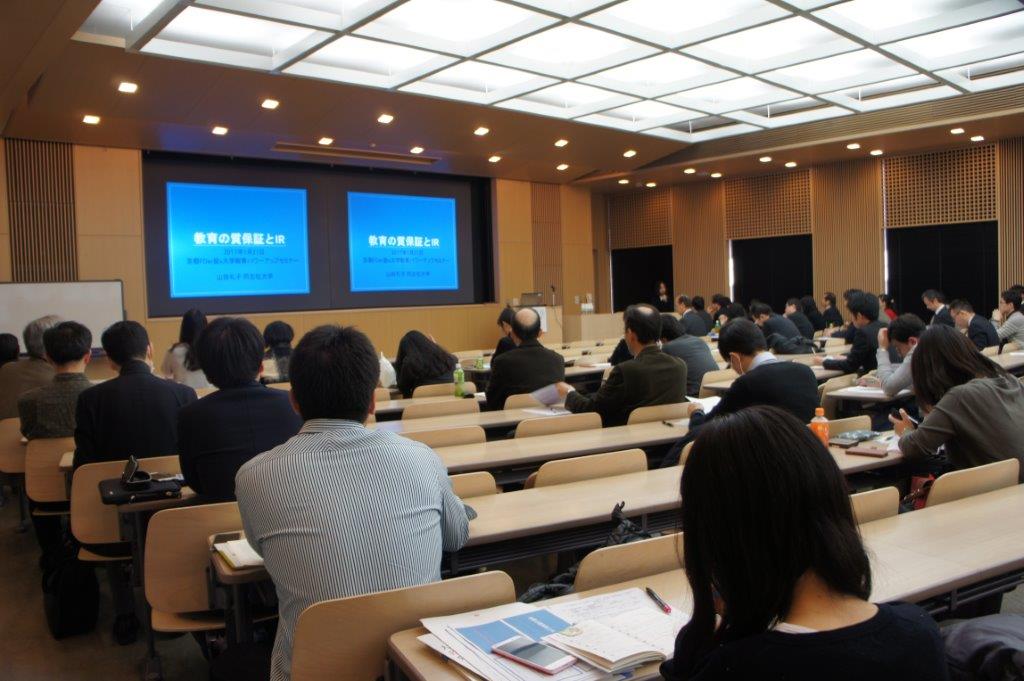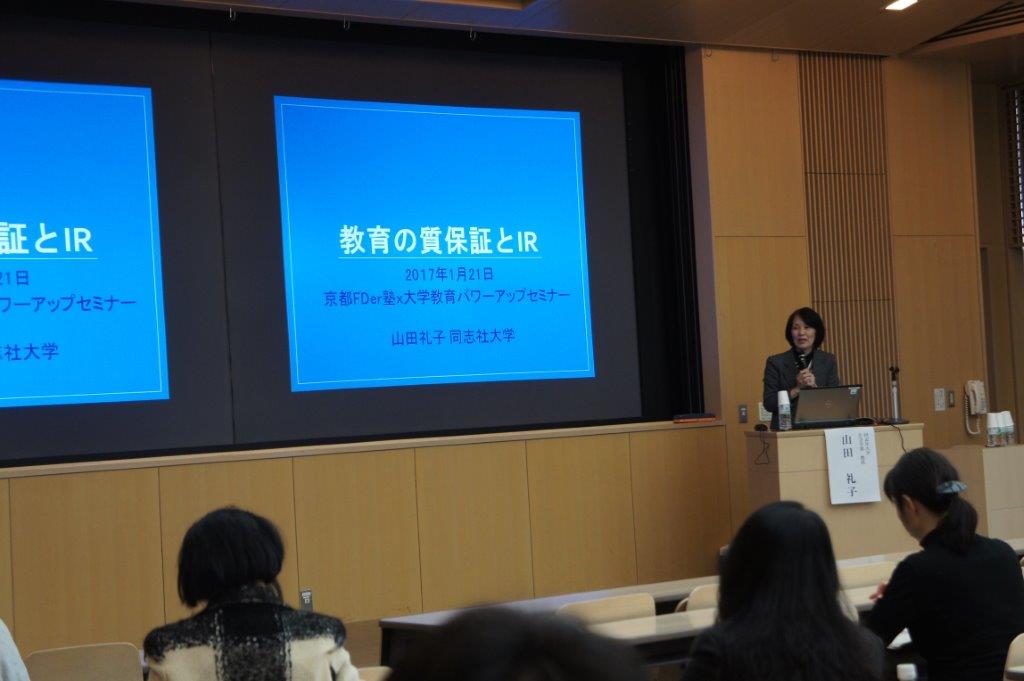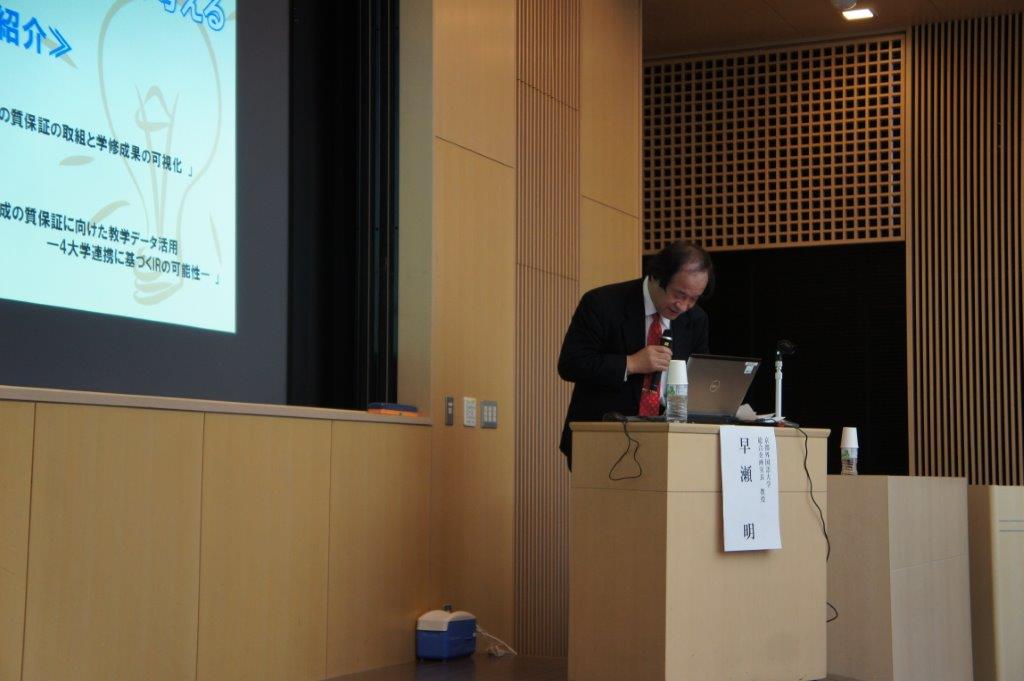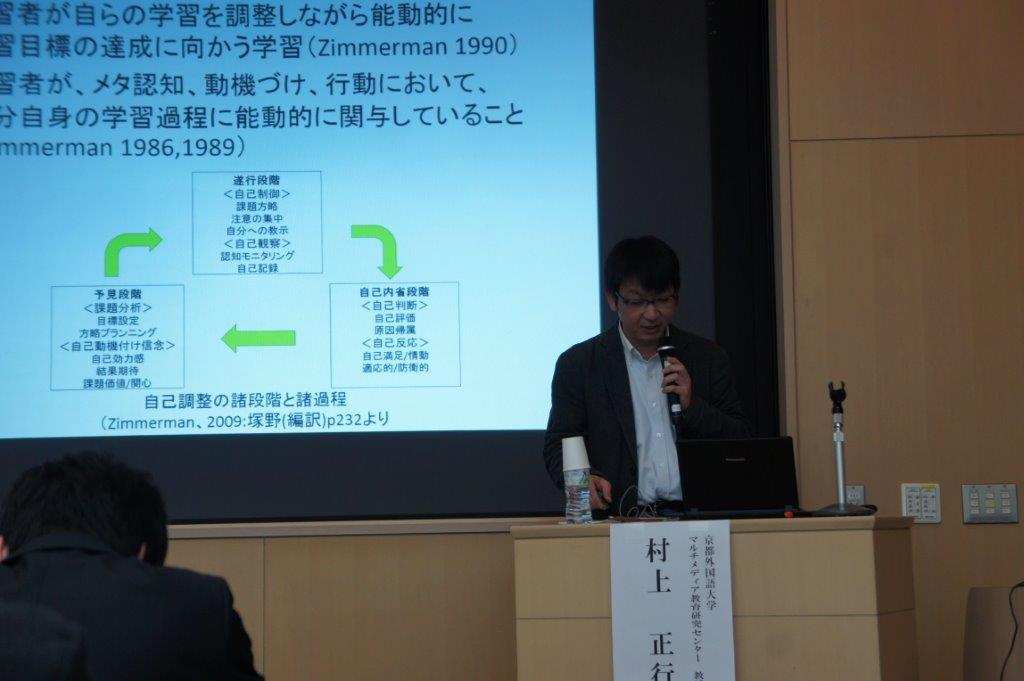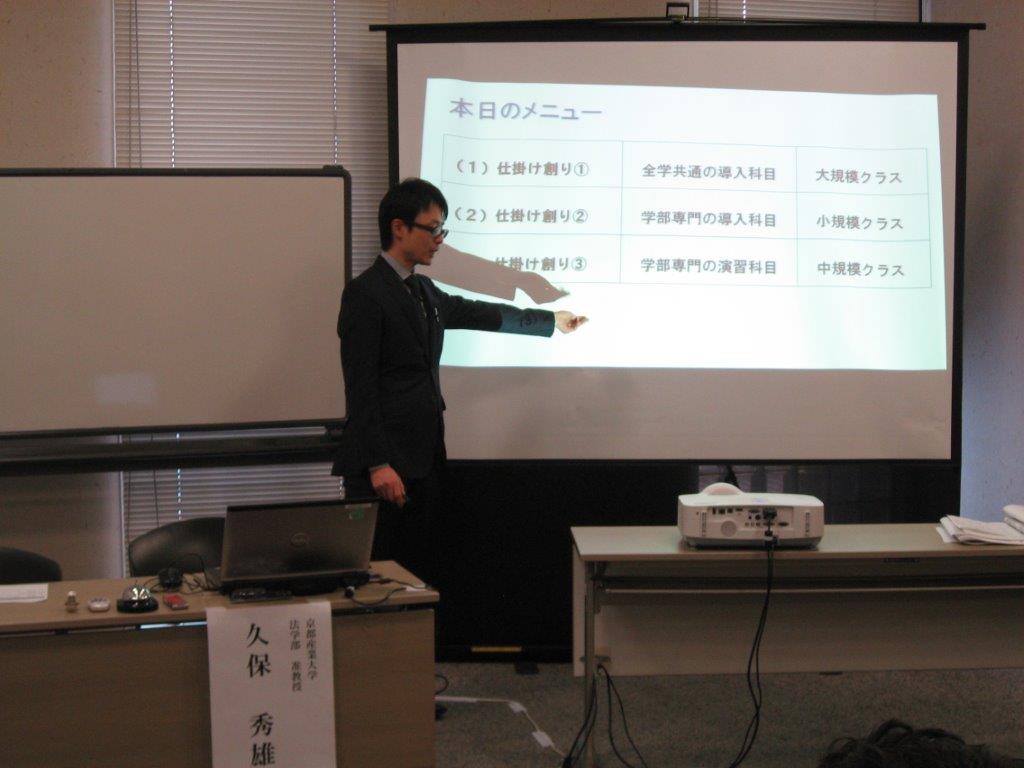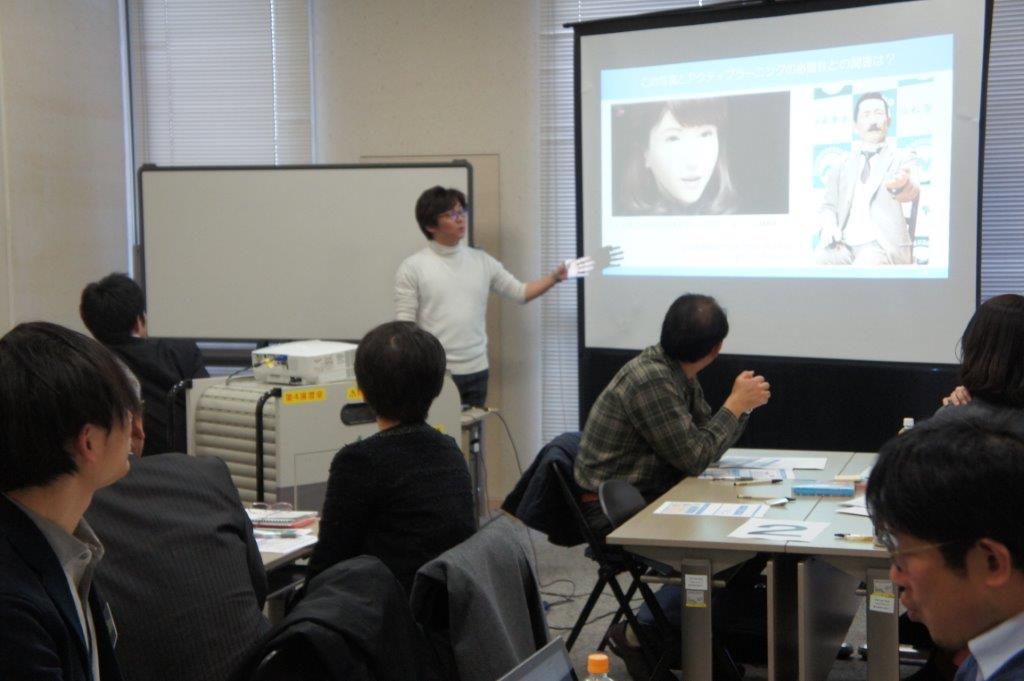Outline of the event
(In FY2016, it will be held as a joint project with the University Education Power-Up Seminar)
In FY2016, it will be held jointly with the University Education Power-Up Seminar.
Kyoto FDer Juku will be held as a "Keynote Speech" and "Subcommittee A".
2016 Kyoto FDer Juku × University Education Power-up Seminar Joint Project
Theme: "Thinking about Quality Assurance of Education"
Amid the emphasis on measures related to quality assurance of higher education, many universities have introduced GPA systems and visualized learning outcomes, and are required to develop IR functions and establish departments. In addition, at the field level, creativity in classes, such as active learning and lesson design, is required every day. Against this background, this fiscal year, Kyoto FDer Juku and the University Education Power-up Seminar were jointly held, and the keynote speech was on the relationship between quality assurance of education and IR, and the three subcommittees introduced case studies and two workshops, incorporating both macro and micro perspectives.
- Schedule
- Saturday, January 21, 2017 13:00~17:00 (Doors open at 12:30)
- Venue
- Campus Plaza Kyoto 5F Lecture Room 1 and Seminar Room 2~4
- Organizer
- University Consortium Kyoto
- Target
- University faculty members, staff, and other university officials who are interested in FD
- Attendance fee
- For member schools: Free
For non-member schools: ¥1,000 (Please pay at the reception on the day) - Quorum
- Keynote speech: 150 people Subcommittee A: 110 people Subcommittee B: 20 people Subcommittee C: 20 people
*Applications will be accepted on a first-come, first-served basis.
- Content
- Information flyer [Click here for details]
| Keynote speech 13:00-14:30 [Capacity: 150 people] |
“Quality Assurance of Education and IR” by Reiko Yamada (Professor, Faculty of Sociology, Doshisha University) |
|
| Summary: In the context of policy orientation to promote quality assurance in higher education, many universities have already implemented measures such as the introduction of the GPA system, the CAP system, and the realization of credits. However, in order to fully utilize these measures and promote quality assurance, it is becoming necessary to develop a function called IR and to establish such a department. With the publication of educational information, it is highly likely that IR departments will be tasked with centralizing data and processing it for the “University Portrait” that will be launched in the future. Furthermore, as university governance is required, the view of IR as a support tool for governance is also emerging. IR is said to have been born in American higher education institutions in the 1960s. Many higher education institutions in the United States have permanent IR departments whose main tasks are obtaining, analyzing, and managing various internal university data, including educational, management, and financial information, formulating strategic plans, and preparing reports and self-evaluations for accreditation agencies. Due to these activities, IR departments are seen as a department that supports decision-making regarding organizational management, but they also collect and analyze data for educational improvement and are involved in developing student surveys as a tool for educational improvement. In that sense, it can be said that the IR department is deeply involved in the quality assurance of education within the university. In particular, the correlation between internal quality assurance and IR is high. In this lecture, I will analyze the relationship between educational quality assurance and IR in relation to policy trends. |
||
| Subcommittee 15:00~17:00 [Capacity] Subcommittee A:110 people Subcommittee B:20 people Subcommittee C:20 people |
Division Meeting A |
case study |
| ①Kyoto University of Foreign Studies “Efforts to Assure the Quality of Education at Kyoto University of Foreign Studies and Visualization of Learning Outcomes” by Akira Hayase (Professor, General Planning Office) and Masayuki Murakami (Professor, Multimedia Education and Research Center) Summary: Kyoto University of Foreign Studies was selected for the Acceleration Program for University Education Renewal (AP) in 2014 as a combined program (Theme I and Theme II). The background to this is the construction of a university management system based on a five-year plan, within which quality assurance of education is also positioned. This report explains the quality assurance of education at Kyoto University of Foreign Studies, and introduces the outline of the AP project, IR efforts, and visualization of learning outcomes as concrete measures to achieve this. |
||
| 2) Aichi University of Education ”Utilizing educational data to ensure the quality of teacher training at Aichi University of Education – the potential for IR based on collaboration between four universities” Kyomen Tetsuo (lecturer, School Education Course) Summary: Aichi University of Education’s Teacher Training Development Collaboration Center is collaborating with Hokkaido University of Education, Tokyo Gakugei University, and Osaka Kyoiku University (HATO Project) to carry out IR activities with the aim of improving teaching. This presentation will introduce the specific details of the collaboration, such as creating a survey on attitudes towards common topics and sharing data, and discuss its significance. Furthermore, as an attempt to ensure the quality of teacher training, a report will be made on efforts to achieve the university’s educational goals based on the analysis of surveys of new students and upperclassmen. A joint report by the three: Take Hiroko (Teacher Training Development Collaboration Center), Kyomen Tetsuo (School Education Course), and Takatsuna Mutsumi (School Education Course) |
||
| Division Meeting B |
[Active Learning x Workshop] “Creating various mechanisms to promote mutual learning and growth” Hideo Kubo (Associate Professor, Faculty of Law, Kyoto Sangyo University) <Summary> Active learning (AL) classes depend heavily on the students, so there is a fair amount of potential for failure due to miscalculation by the class administrator. Unlike a one-way lecture, there are many more points to consider, such as the need to respond immediately to unexpected reactions and behaviors of students. Therefore, by working together to create mechanisms to solve problems that tend to arise in AL classes, we hope to hone the sense necessary to make AL classes successful, and share know-how on AL classes that can be used in a variety of ways, from first-year introductory education to specialized seminars, and from small-group subjects to large-group subjects. |
|
| Division Meeting C |
[AL-style lesson design x workshop] “Designing lessons that bring out ‘proactive, interactive, and deep learning'” Takeshi Yamada (Associate Professor, Center for the Promotion of Research and Development in Higher Education, Kyoto University) <Summary> Cultivating human resources who can survive in modern society is the mission of higher education institutions and an urgent issue. At the heart of this is a qualitative transformation of education and improvement of the quality of classes, with active learning being recommended as a concrete method. This subcommittee will focus on how to design and implement lessons that bring out “proactive, interactive, and deep learning,” and will be held in a participatory workshop format. |
|
Application
- How to apply (apply by e-mail)
- Subject: "0121 Kyoto FD Application"
Full Text:
(1) Name (furigana)
(2) Affiliation (organization name / department)
(3) Teachers, staff, others, etc.
(4) E-mail address
(5) Whether or not to participate in the keynote speech: Example: Participation, non-participation
(6) Subcommittee of choice: Example of entry:
Subcommittee A, Subcommittee B, Subcommittee C, non-participationPlease apply by e-mail to fdrd■consortium.or.jp (please change ■ to @) with
the above contents.
We will send you a confirmation email after receiving your application. - Deadline for application
- Saturday, January 14, 2017
Implementation Report
On Saturday, January 21, 2017, the University Consortium Kyoto jointly organized the "Kyoto FDer School" and the "University Education Power-up Seminar" under the theme of "Thinking about Ensuring the Quality of Education," with 99 participants from member and non-member universities.
Ensuring the quality of education is an eternal issue for universities, and many universities have introduced GPA systems, visualized learning outcomes, and are required to develop IR functions and establish departments. In addition, at the field level, creativity in classes, such as active learning and lesson design, is required every day. Against this background, the keynote speech was about the relationship between educational quality assurance and IR, and the second half was divided into three subcommittees (Case Studies, Active Learning Workshop, and AL-type Class Design Workshop).
First, in the keynote speech, Dr. Reiko Yamada (Professor, Faculty of Sociology, Doshisha University) gave a keynote speech on the theme of "Quality Assurance of Education and IR." Although IR has been spreading in the university industry in recent years, about 70% of universities do not have a university-wide IR organization, and he pointed out the problem that IR functions are limited and ambiguous, and explained the necessity of "educational IR" by stating that education quality assurance is now entering the third stage (returning data results and evaluations to student education).
In the second half, three subcommittees were held simultaneously, and in Subcommittee A, case studies were introduced by two universities, and Professor Akira Hayase (Professor, General Planning Office) and Professor Masayuki Murakami (Professor, Multimedia Education and Research Center) of Kyoto University of Foreign Studies introduced case studies on "Efforts to Guarantee the Quality of Education and Visualization of Learning Outcomes at Kyoto University of Foreign Studies" adopted by the Program for Accelerating the Revitalization of University Education (AP). Dr. Tetsuo Kyomen (School Education Course, Lecturer) of Aichi University of Education gave a case study on "Utilization of Teaching Data to Ensure the Quality of Teacher Training at Aichi University of Education: Possibility of IR Based on Collaboration among Four Universities."
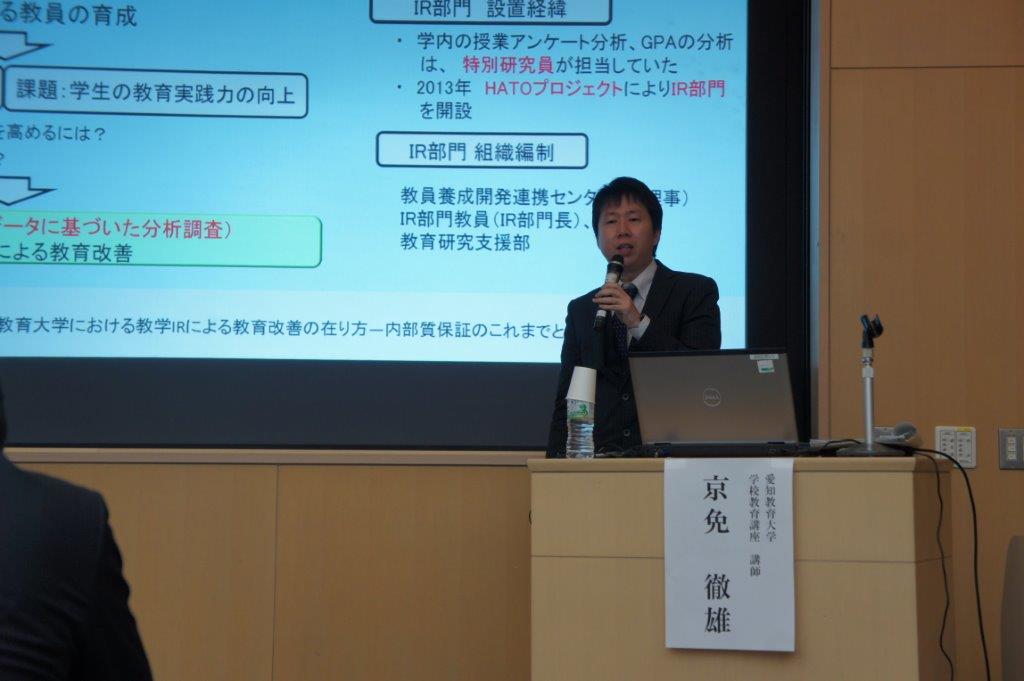
In Session B, a workshop was held with the keyword of active learning, which is equivalent to a university education power-up seminar, and Professor Hideo Kubo (Associate Professor, Faculty of Law, Kyoto Sangyo University) talked about the work of creating mechanisms to solve problems that tend to occur in active learning classes under the theme of "Creating various mechanisms to promote mutual learning and growth."
Subcommittee C also held a workshop on AL-type classroom design, which is equivalent to a seminar on power-up university education, and Professor Takeshi Yamada (Associate Professor, Center for the Promotion of Research and Development of Higher Education, Kyoto University) gave a lecture on the theme of "Designing Classes that Bring Out 'Proactive, Interactive, and Deep Learning'" He talked about the design of the class and its practice.
Finally, in the results of the questionnaire for this joint project, 57 of the 61 respondents who responded to the questionnaire answered "satisfied" or "somewhat satisfied" in terms of overall satisfaction, indicating a high level of satisfaction. In particular, all respondents answered "satisfied" with the satisfaction of subcommittees B and C, making the workshop-style breakout sessions very meaningful.
In addition, many positive comments were received, such as "I was able to understand the meaning of IR from the situation surrounding the university and I was able to learn about specific educational activities," "I felt a sense of fulfillment in the two-part structure, and I thought that it would be better if faculty and staff of each generation were aware of it as a whole," and "I was able to obtain information that will lead to the resolution of issues that are issues for our university."
Contact information
Consortium of Universities Kyoto in charge
of FD business TEL 075-353-9163 FAX 075-353-9101
〒600-8216 Campus Plaza Kyoto
, Shimogyo-ku, Kyoto *Business hours: Tuesday ~ Saturday 9:00~17:00 (excluding year-end and New Year holidays)













